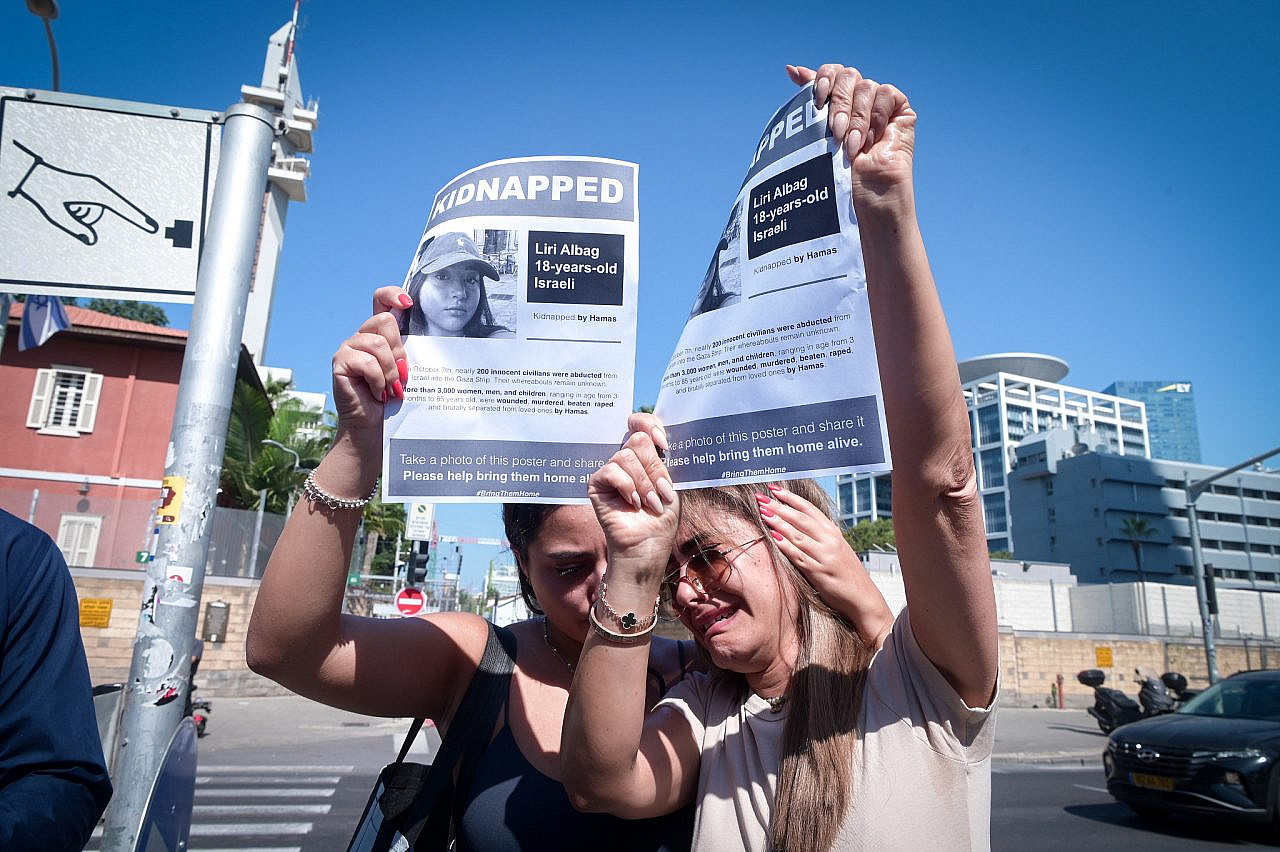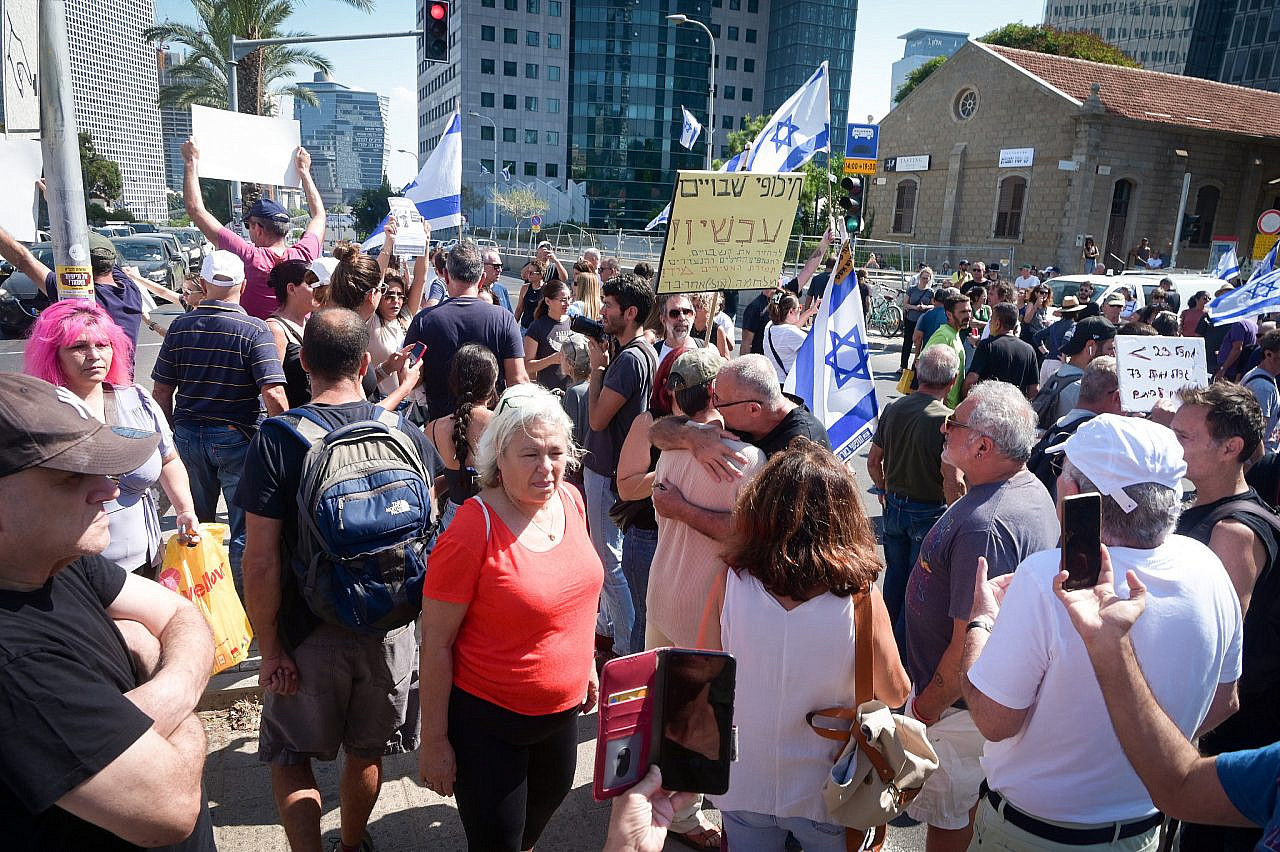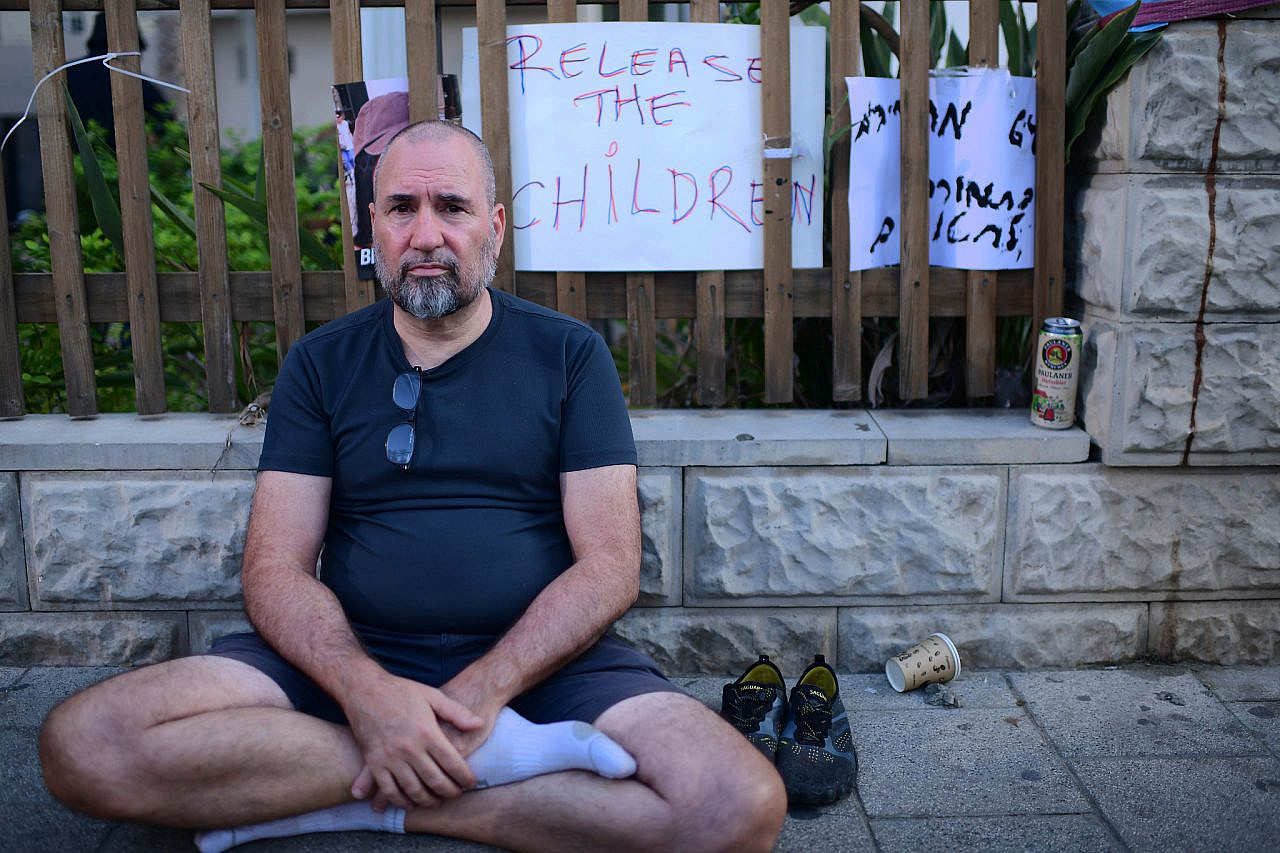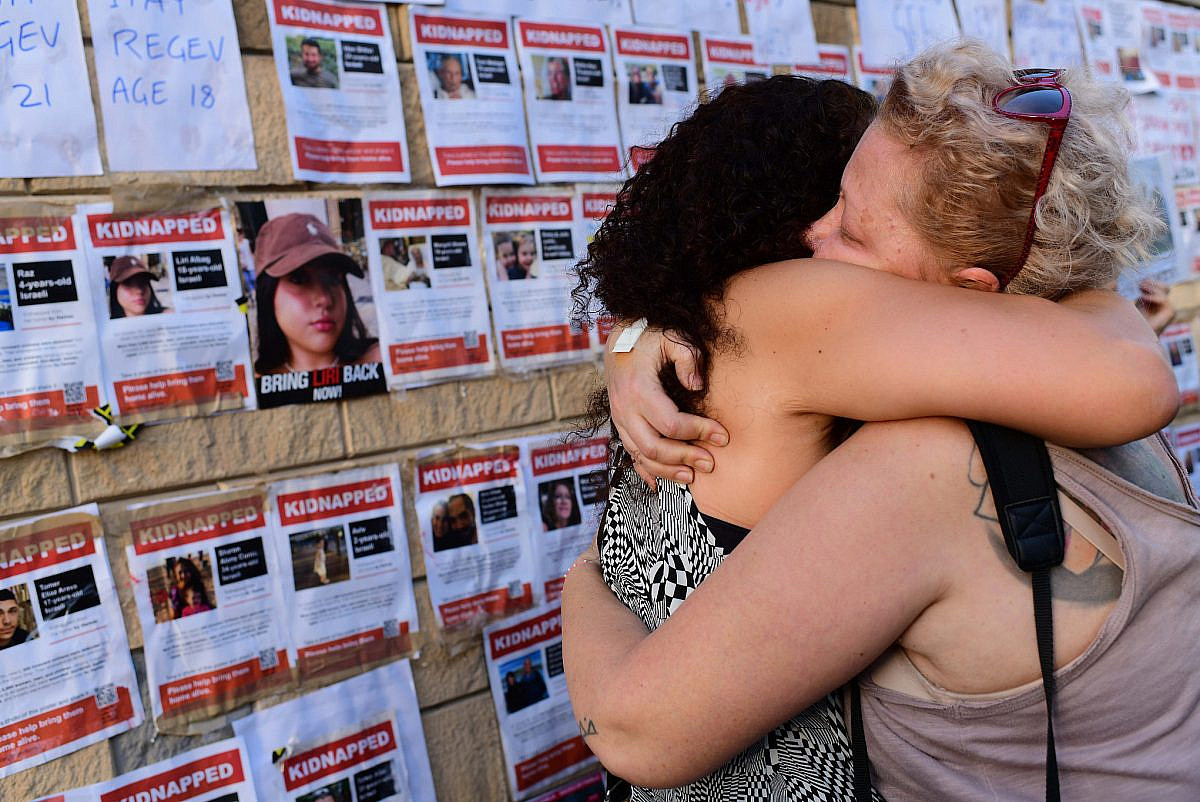A photo began making the rounds on Israeli social media yesterday of Avichai Brodetz, whose wife and three children were kidnapped by Hamas from Kfar Aza and taken to Gaza during the Oct. 7 attack, sitting on a plastic chair outside the Israeli military headquarters in Tel Aviv. By 11 a.m. several dozen people had joined him. Within a few hours, the street was full of furious protesters, agonizing over their missing loved ones. “We are here and we won’t leave until they bring back all the hostages,” one woman said to her friend, both of them sobbing.
It is believed that at least 199 people were kidnapped by Hamas militants who broke through the Gaza fence last Saturday, as part of a surprise attack that killed over 1,400 in Israel. The Israeli army subsequently launched an assault on Gaza that has killed at least 2,383 Palestinians, and is preparing to enter the strip with thousands of troops in a large-scale ground invasion.
Glued onto a sign outside the military headquarters that read “Closed Military Zone — No Photography” was a photo of an 18-year-old abductee, Liri Elbag. Contrary to the sign’s prohibition, camera crews filled the area, and protesters spilled out onto the sidewalk and the street in front of the headquarters. A soldier tried to move the photographers away, but was unsuccessful.
At around 2:30 p.m. a truck pulled up loaded with cement blocks, and the driver began to assemble what appeared to be a wall blocking off the entrance to the building. But the protesters wouldn’t have it: led by one screaming woman, they circled the truck and refused to budge. Eventually, the driver accepted defeat and the truck drove off, accompanied by chants of “shame” from the families of the kidnapped. Others wept. It was a tiny victory for the families fuming with rage at the military establishment tasked with bringing their loved ones back home.
‘Everything we know is from videos on Telegram’
The family of Liri Elbag arrived at the protest carrying dozens of posters, each emblazoned with their missing daughter’s face. Elbag worked in the military’s surveillance branch and had been assigned to its Nahal Oz base, right next to the Gaza Strip, just a week before her abduction.
“Liri called her mother at 6:30 that morning and told her, ‘We hear gunshots,'” her aunt, Noa First, recalled of the day her niece was abducted. The army did not contact the family on the morning of her kidnapping, and her mother and uncle went to Soroka Hospital in Be’er Sheva to look for her.

Early in the afternoon on the day of the Hamas attack, Liri’s sister tracked her phone’s location and saw that the phone was in Gaza. “Friends of ours showed us a video where you can see her being thrown into a jeep, her hands tied,” Elbag’s aunt said. “We told her mother, ‘Come back. You won’t find her in the hospital.’”
The day after her abduction, an army representative arrived at the family’s home at half past midnight to tell them what they already knew. “No one other than this single representative came to talk to us. Everything we know is from videos on Telegram,” her aunt continued.
Outside the military headquarters, the protesters started shouting spontaneously. One of the demonstrators, Alon Avrami, was interviewed by an Australian TV news channel. “We deserve better than this,” he shouted. “The Israelis, and also the Palestinians, deserve peace. Netanyahu will not give us that. We deserve to have our hostages brought home today. A humanitarian corridor today!” The Australian reporter thanked him, and he burst into tears.
Protesters gathered around him, supporting him with shouts of “Shame!” Others refused to join in, fearing that by doing so they risked politicizing the protest; chanting “Shame!” has become an indelible mark of the mass protests against the Israeli government’s judicial coup that had taken place for 39 consecutive weeks up until last Saturday, and some of the families and their supporters feared that using the same chants would make them seem too anti-government.

“We’re trying to build solidarity with one another — there is no right and left here, only sorrow and pain,” said Yael Shani. Her friend, the late Ma’ayan Mor, was at the music festival in Re’im, which, in Shani’s words, was “a party that turned into hell on earth.” Mor and her partner managed to get in a car and escape, but when they reached the village of Kissufim, they were burned to death in their car as a result of Hamas’ continuing attacks. “Everyone knows that the residents of the south have been abandoned,” Shani continued. “The only politician who has helped us is [U.S. President] Biden. What’s happening here is ridiculous. We want real leaders.”
Other protesters addressed the international community. The niece of 72-year-old abductee Adina Moshe from Nir Oz told reporters: “My aunt is a sick woman. I’m asking the whole world, humanitarian organizations, to help us bring her back — her and all the others kidnapped. There are children, 3 or 4 years old. All the world has to now concentrate on how to bring them back.”
‘This protest is the beginning’
“The periphery [a term used to refer to the areas outside of Israel’s urban center] has not been a priority [of the government] for years,” said Noa Rotem, a resident of Matzuva in northern Israel, whose population was evacuated on Oct. 8 because of its proximity to the Lebanese border. “I went with my children to my parents’ house. I’m here because I can’t sit still.”
Rotem carried a sign with the names of kidnapped children. “I feel sort of torn as to whether we should call for the release of the hostages or force the government to resign,” Rotem continued. “As someone who has been protesting for 40 weeks [against the judicial coup], it’s very difficult for me to separate the two.”

The demonstration itself reflected Noa’s ambivalence. If at first people only shouted “Shame!” in less than an hour they were shouting “Criminal government!” and “Send Bibi to prison!” Not a single protester openly defended the coalition, but victims’ families voiced concerns that political messaging would make a divisive far-right government even less likely to return their loved ones. If the protesters had anything in common, it was that they all felt the government had abandoned them and their loved ones.
“It’s just an ongoing humiliation,” said Yiftach Cohen, several of whose family members were kidnapped. He was not at the demonstration in Tel Aviv, and spoke to me instead by phone: “It’s hard for me to expect anything from this government — a government that doesn’t talk to the people; a government that continues the madness of plundering this country.” Among Cohen’s kidnapped family members are his aunt, Margalit Mozes; his uncle, Gadi Mozes; Gadi’s partner, Efrat Katz; Efrat’s daughter, Doron Asher (Katz); and Doron’s daughters, Aviv (3) and Raz (5).
Most read on +972
Last Thursday, Cohen visited a hotel in Eilat housing survivors from Nir Oz, one of the communities near the Gaza fence that was targeted by Hamas. “When I arrived at the hotel, I called my cousin from the lobby, and she told me where to find her,” he said. “It was only about 30 meters from me, but every person I passed along the way was hugging me, and we were crying. After half an hour she called me and asked where I was. The conversations there were really tough. After every conversation like that, you fall apart.”
Cohen’s friends came to Tel Aviv and wrote the names of his kidnapped relatives on pieces of paper, sticking them on the wall of missing people that protesters created in front of the army headquarters. One protester, Yael Greenberg, told me: “This is actually the first chance we’ve had to publicly express our grief.” Greenberg came to the demonstration after someone sent the photo of a lonely Brodetz in the parents’ WhatsApp group at her childrens’ school. “Right now, this all seems so disorganized, but I have a feeling that this protest is the beginning of more sustained action,” she said.
A version of this article was first published on Local Call. Read it here.





